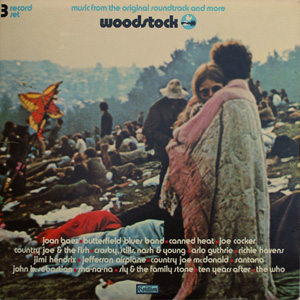The 1970 Smackdown is coming! To kickoff our look at everything 1970, here's Chris looking the music of that year's landmark Oscar-winning documentary...
 We love examining the lasting cultural impact of our subjects here at Soundtracking, but rarely do the soundtracks explored serve as a cultural artifact themselves. Woodstock is an event that became a part of the American story, and essentially by accident. It was more than a concert, but a landmark display in anti-war sentiment and activism through artistry. Michael Wadleigh’s staggering cinematic account shows how music and movement lived symbiotically during the era, empowering a generation and an art form.
We love examining the lasting cultural impact of our subjects here at Soundtracking, but rarely do the soundtracks explored serve as a cultural artifact themselves. Woodstock is an event that became a part of the American story, and essentially by accident. It was more than a concert, but a landmark display in anti-war sentiment and activism through artistry. Michael Wadleigh’s staggering cinematic account shows how music and movement lived symbiotically during the era, empowering a generation and an art form.
One of the significances of the concert film is that it allows the viewer to participate in a musical moment that they didn’t get first-hand. But the very best of the genre (see: Stop Making Sense) imbue their own perspective of the artistry on display and provide something an attendee of the live experience couldn’t have lived. Here Wadleigh creates a split-screen, all-encompassing view of the weekend, one that presents the crowd and the musicians as peers moved by the same feeling.
But the overwhelming spectacle of the descending of the masses and the business of mounting the festival quiets immediately the music takes over. When Richie Havens takes the stage to kick off the festival, it’s like a tunnel vision of inspirational awe. In the hushed crowd and removal of its split-screen device, we’re drawn into the rock and roll release with a laser focus.
If you’re looking for a collection of hits from the biggest musical names featured in the film, you’re likely to come away confused and perhaps missing the power of what the film captures. In fact some of the bigger names, like Janis Joplin and Jefferson Airplane, weren’t even featured in the original release. (The nearly four hour director’s cut is a beast, but the expansiveness does capture the momentousness of the festival.) No, the point of the film is to showcase the cultural movement of peace and love, the message in the music.
Not that the film isn’t without its musical bits of once-in-a-lifetime witnessing. Havens created “Freedom” on the spot, urged on by the crowd after running out of songs to play. We witness the very moment that Santana, a last minute addition to the lineup, skyrocketed to notoriety. But its when the spirit of peace and love take over that we feel the real occasion of the event, and its enduring legacy. Like Joan Baez’s trilling and assured vocals, we feel a great sadness for the world as it is but a resoluteness to change it for the better.
The film ultimately serves as a document of America and rock and roll at a certain place in time, both time capsule and testament to the uniting power of peace. It’s like a funeral wake for a dying era of American status quo and emergence of riskier rock and roll (perhaps the most American art form of all). It makes you wish for our own burst of artistic innovation coupled with a transformative political event.
All Soundtracking installments can be found here!